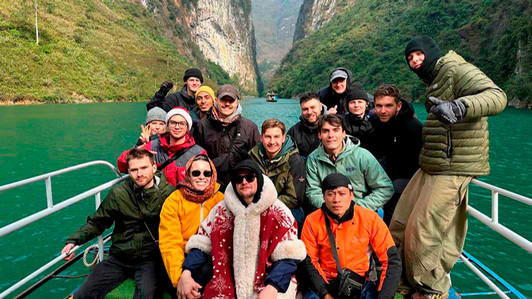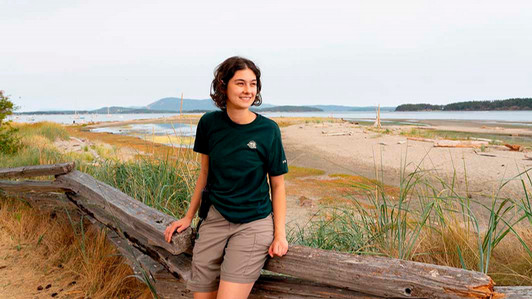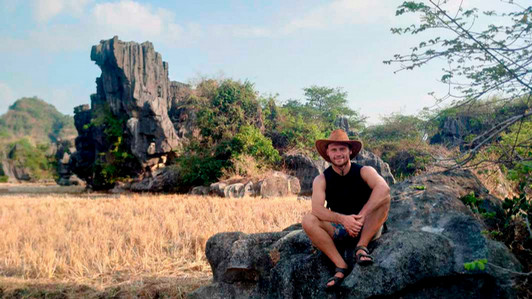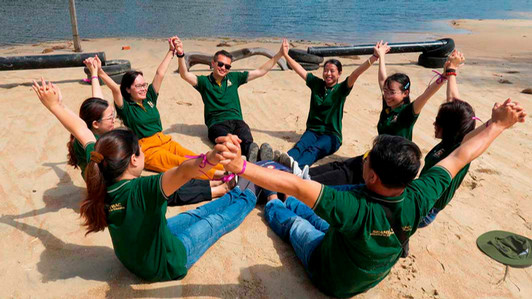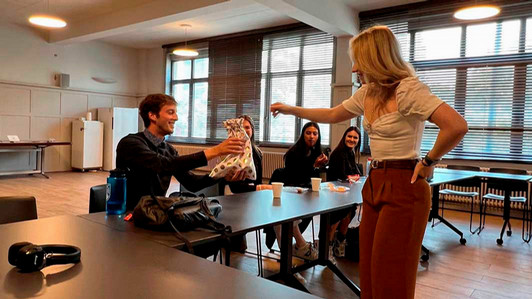Social Sciences
If you're studying social sciences, you could participate in co-op in:
- Anthropology
- Climate Science
- Economics
- Environmental Studies
- Geography
- Political Science
- Public Administration (co-op is mandatory in this program)
- Psychology
- Restoration of Natural Systems
- Sociology
Learn how co-op works and read about students' experiences. Plus, check out how co-op can work with your schedule.
Graduate students
All Social Sciences graduate students are eligible for co-op. You can apply in September after you have started your program and before you finish your final project (e.g., thesis, major project or dissertation). Speak to your supervisor about your plans.
How co-op works
Co-op gives you hands-on paid work experience related to what you're studying. It's the perfect way to develop your skills and find a career you love.
Learn more about what co-op is, how it works with your degree, and what to expect as a co-op student.
The number of work terms you'll complete varies:
- co-op (undergraduate): completing 3 work terms earns the co-op designation
- co-op (graduate): completing 2 work terms (master's) or 3 work terms (doctoral) earns the co-op designation
- work experience program*: 1 or 2 work terms
*Typically, students in Social Sciences are admitted to co-op (not the work experience program). If you join co-op, you can choose to complete fewer co-op work terms than the required number, but you will not receive the co-op designation when you graduate.
Learn more about:
Where can you go with co-op?
Wherever you want!
Set a goal and work towards it - you'll build skills and gain experience one each work term. Here are a few examples of goals that some students have set.
Goal: to work in international development
- First co-op: co-op writer for The Lookout Newsletter with the National Defence Canada in Esquimalt
- Volunteer position: committee member with the Quadra Village Community Centre
- Second co-op: communications assistant with Public Works and Government Services Canada
- Third co-op: junior program officer/analyst with the Canadian International Development Agency
Goal: To work as a policy maker and analyst
- First co-op: science facilitator with Science World in Vancouver
- Volunteer position: research assistant with a T.A./graduate student to help with their graduate research
- Second co-op: research assistant with BC Ministry of Labour and Citizen’s Services
- Third co-op: policy analyst with the BC Ministry of Energy and Mines, Mineral Titles Branch
What can you do with your degree?
Not sure what career options you'd like to explore? Use this tool to explore the possibilities.
Requirements
To join social sciences co-op, you must be a full-time student and have completed your first year of study. You should not have completed all the coursework for your degree as the program is meant to be completed during your curricular studies. You must also meet the following GPA requirements:
- Anthropology: overall GPA 5.0. Average GPA 5.0 in all ANTH courses
- Economics: overall GPA 4.5
- GPA 4.5 in Econ 103 or 103C or 180 and 104
- If you do not meet this minimum GPA but have already taken ECON 203 and/or 204, you may meet the GPA requirement through these courses rather than through the corresponding first-year courses (for example, if you don't meet the 4.5 GPA minimum on 103 and 104, you may have an average of 4.5 on 103 and 204)
- Before starting your first work term, you must successfully complete the Introduction to Professional Practice course offered by the Co-op office and all of ECON 203, 204 and 245. ECON 246 is also highly recommended.
- Environmental Studies: overall GPA 5.0
- Geography: overall GPA 4.5
- GPA 4.5 in all GEOG courses
- Political Science: overall GPA 5.0
- GPA 5.0 in 100- and 200-level POLI courses
- Psychology: overall GPA 5.0
- average GPA 6.0 (B+) in all PSYC courses
- Restoration of Natural Systems: overall GPA 5.0
- completion of RNS core courses
- Sociology: overall GPA 5.0
- GPA 5.0 in SOCI 100, 210 and 211
Program formats
Social Sciences Co-op is flexible to your schedule. You will take part in one of the following formats, depending on where you are in the completion of your degree:
- traditional co-op: completing at least 3 co-op work terms to earn the co-op designation
- work experience program: completing 1 or 2 work terms
How you complete your co-op terms can also vary:
- you can work part time while taking courses. Parallel (part-time) co-op depends on employer and student needs
- you can complete 2 or 3 work terms consecutively with the same organization (some students and employers appreciate longer placements) or with different organizations
Learn more about these types of co-op.
How to join
You can apply to join co-op between June 9 and September 19, 2025 by logging into the co-op portal.
- use your UVic NetLink ID and password
- once logged in, select “Co-op” on the navigation menu
- follow the prompts to complete your application
Note: You'll be unable to apply if:
- you're NOT in the Faculty of Social Sciences
- you're trying to apply outside of the admission periods
If you are unable to apply through the portal, please contact your co-op coordinator.
Once you're admitted
Once admitted, you'll enroll in the exclusive-to-co-op Introduction to Professional Practice course in Brightspace. It includes self-directed reading and assignments, as well as live Zoom meetings offered several times each week to fit your schedule
Sample jobs and employers
Social sciences students are technically skilled (numbers, technology) as well as interested in community, social and environmental involvement (communication and collaboration skills).
Students engage in diverse interests and work environments—environmental, industrial and corporate, public-sector policy, private equity and banking, data management, social services and community development.
Anthropology
- Parks Canada – park naturalist
- Black Press / UsedVictoria – social media and communications coordinator
- Aboriginal Affairs and Northern Development Canada – Residential Schools Resolution research assistant
- UVic Welcome Centre – student recruiter
- Sooke Museum – museum assistant
Climate Science
-
BC Ministry of Emergency Management – climate readiness co-op
-
BC Ministry of Forests – climate change co-op student
-
City of Abbotsford – Environmental co-op student (climate action)
-
Coast Capital Savings Credit Union – co-op in climate action
-
Environment and Climate Change Canada – service delivery co-op –Canadian Centre for Climate Services
-
Gorge Waterway Action Society – climate interpreter
Economics
- Financial Institutions Commission – risk analyst
- CIBC Wood Gundy – investment advisor assistant
- BlackBerry – pricing analyst
- BC Ministry of Energy and Mines – policy assistant, Mines and Minerals Resources
Environmental Studies
- BC Ministry of Environment – Water Resources research assistant
- Public Works and Government Services Canada – Contaminated Sites Project Management assistant
- Parks Canada – park naturalist
- Recycling Council of Alberta – recycling ambassador
Geography
- Parks Canada – ecological monitoring assistant
- Fisheries and Oceans Canada – Canadian Hydrographic Service – GIS analyst
- BC Ministry of Energy and Mines – mapping assistant
- BC SPCA, WildARC – wildlife rehabilitation assistant
- Sooke Regional Museum – museum assistant
- Canadian Forest Service – research assistant, Mountain Pine Beetle
Political Science
- BC Healthy Communities – Victoria Youth Council coordinator
- National Defence and the Canadian Forces – Geopolitical and Maritime Security research assistant
- Victoria Disability Resource Centre – workshop program coordinator
- Land Trust Alliance of BC – community outreach officer
- Parks Canada – Gulf Islands National Park Reserve survey coordinator
Psychology
- Rock Solid Foundation – WITS program coordinator
- Island Health – mental health and addictions research assistant
- Alberta Sick Kids Hospital – brain injury research assistant
- Tribune Bay Outdoor Education Centre – recreation coordinator
- BC Ministry of Education – provincial exam marking coordinator
Sociology
- Corrections Canada – junior parole officer
- BC Stats – research assistant
- UVic Welcome Centre – student recruiter
- Beacon Community Services – workshop facilitator & volunteer coordinator
- CanAssist – job coach
Eli Cleves (economics)
Eli Cleves, an Economics student, took the opportunity of completing a co-op at Book Talk English Learning Center in Hong Kong as a social media and events coordinator and an English teacher.
Grace Decker (geography)
Born and raised in Salmon Arm in the British Columbia interior, geography co-op student Grace Decker has nourished a passion for the environment and being outdoors that brought her to the...
Jack Morel (political science)
Jack Morel is something of a climate superstar—he made such a difference during his first work term as a climate change policy analyst with the Ministry of Forests that he was asked to...
Jake Crocker (economics and mathematics)
Jake Croker, a combined major in Economics and Mathematics with a minor in Business, travelled across the world to complete a co-op work term in Jakarta, Indonesia. Working as a program assistant...
Jared Bendall (history and political science)
Jared Bendall, recently graduated with a degree in History and Political Science from UVic, worked as a public engagement intern for SEAMEO RETRAC, The Southeast Asian Ministers of...
Jenna Inch (political science and European studies)
Jenna Inch (political science and European studies) spent a co-op term as a junior policy analyst with the Canada EU Trade and Investment Association (CEUTIA) in Brussels, Belgium, where she helped...
Average salaries
You'll receive a salary from your employer during each co-op work term. Co-op salaries vary according to many factors, including:
- your previous work experience
- the industry you're working in
- the responsibilities of your co-op job
Here is an average monthly salary for a work term in social sciences:
- undergraduate: $3119.63
- graduate: $3955.53
Fees
Co-op students pay a co-op tuition fee for each work term. It's free to join co-op and attend the preparation course—you'll pay your tuition fee after you secure a co-op work term.
You'll pay your fees according to the same tuition fee deadlines as regular course fees.
Fees per work term for undergraduate students:
- domestic students: $807.56
- international students: $1,696.74
Fees per work term for graduate students:
- domestic students: $807.56
- international students: $1,015.71
Note that the graduate co-op tuition fee is different than the graduate installment fee. If you are a grad student and register for a co-op work term, during that term, you'll pay:
- the grad co-op program fee
- the grad ancillary fees
If you register for a course (e.g. thesis 596 or 598) and a co-op work term in the same term, during that term, you'll pay:
- the grad co-op program tuition fee
- the course tuition fee
- the grad ancillary fees
Questions about co-op tuition fees? Email us or call 250-721-7032 for assistance.
Career ideas
UVic offers a ton of hands-on learning opportunities related to what you're studying. This includes field schools, internships and more.
You can explore opportunities and career paths for your academic program area:
- Anthropology
- Economics
- Environmental Studies
- Geography
- Political Science
- Psychology
- Restoration of Natural Systems (diploma)
- Sociology
Interested in volunteering? Find a volunteer position that inspires you.
Want to work with an academic adviser? Book an appointment.
Office & contacts
Our regular business hours are Monday to Friday, 8:30 a.m. to 4:30 p.m. Office: Cornett Building, B Wing, Room B138
Co-op coordinators:
Anaïs Holdaway (how to pronounce Anaïs' name)
Anthropology, Climate Science, Environmental Studies, Geography, Political Science, Restoration of Natural Systems, Sociology
alenoir@uvic.ca
Natasha Jamal
Economics (undergraduate) & Psychology
njamal@uvic.ca
250-721-8969
Andrée-Anne Poirier-Leroy
Economics (graduate students)
spaco@uvic.ca
Co-op assistant:
Linda Marley
sscoop@uvic.ca
250-721-8689
Get support
We're here to support you with every step in your co-op journey, from applying to co-op to making sure you're supported at work. Contact your co-op coordinator or office for assistance.
If you identify as having a disability or a mental health condition, if you belong to an equity group, or if you identify as Indigenous, we have additional supports for your co-op experience.

